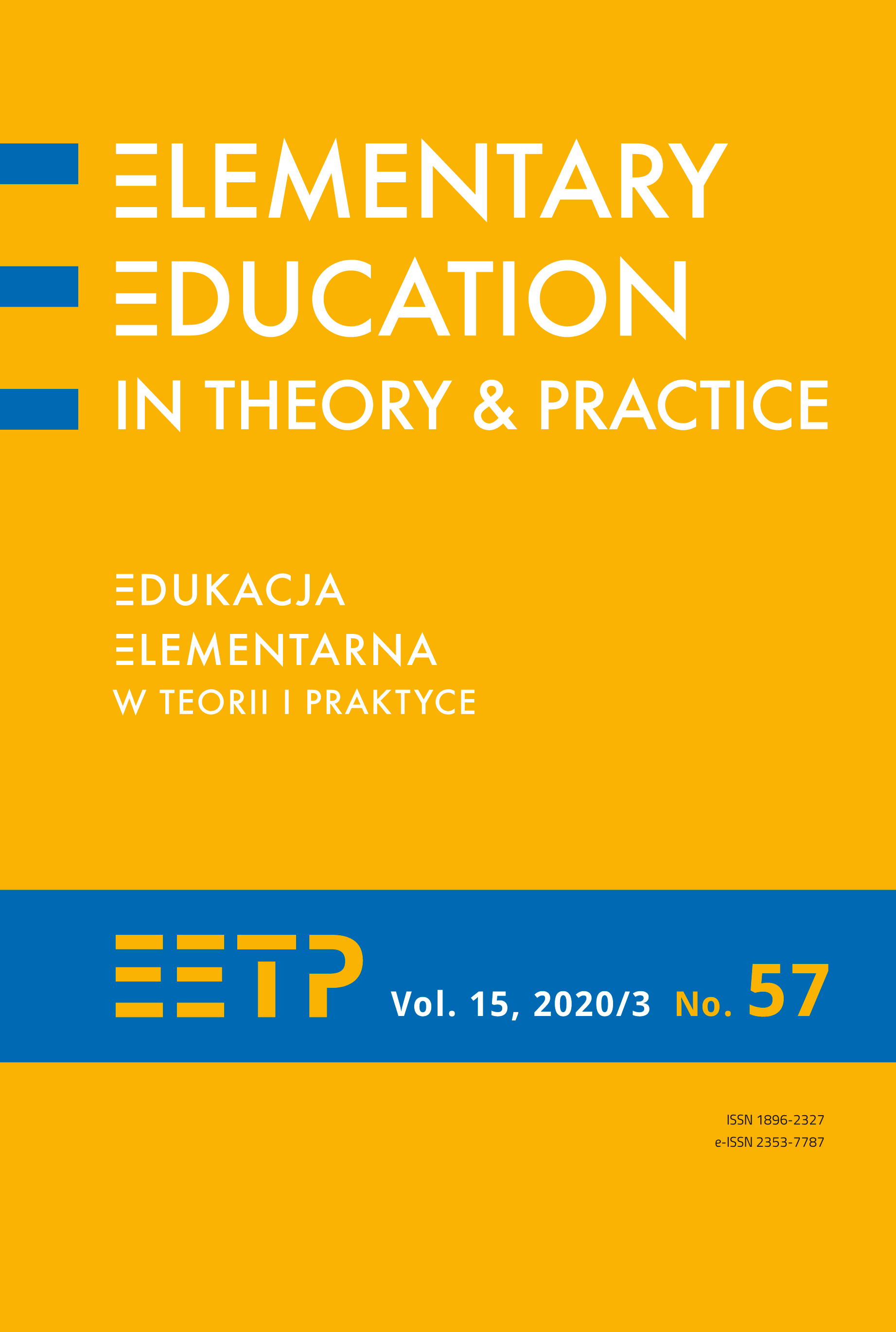Including pupils who have experienced migration during the COVID-19 pandemic
Abstract
The COVID-19 pandemic, which has rapidly spread globally since the beginning of 2020, poses a number of challenges for the educational system. Educational institutions have been closed, and teaching/learning is now being done online. The coexistence of these two events, namely, online learning and pupils who have experienced migration in Polish schools, serve as the starting point for my study. The aim of the study is to obtain feedback from early years teachers on the possible inclusion of pupils who have experienced migration in the online learning process and to identify the self-reported pri- orities for teachers’ tasks during the pandemic and the actual ways in which teachers offer opportunities for inclusion to the students involved in the study. An online survey was used in the study as the research method. The article is composed of two parts: the theoretical part, which describes the educational situation of the students who have experienced migration and selected issues associated with inclusive education, and the empirical part, which provides analysis and interpretation of the data obtained in the study. The study offers conclusions on the hierarchy of priorities for teachers’ tasks (the majority of the respondents mentioned “providing emotional support to pupils”) and the particulars of including students who have experienced migration into the online learning process (a majority of the teachers reported the need for more personalized teaching and close cooperation with pupils’ families). Given the number of respondents (83 teachers) and the survey methodology, the results should be treated with caution. That said, they are worth sharing as an inspiration for early years teachers to seek and reflect on their own solutions to the problem.
References
Chrzanowska I., Szumski G. (2019). Introduction, [in:] I. Chrzanowska, G. Szumski (eds.), Edukacja włączająca w przedszkolu i szkole [Inclusive education in kindergarten and school], Warsaw: Foundation for the Development of the Educational System, Scientific Series, vol. 7 pp. 9–13.
European Commission. (2008). Green paper – Migration & mobility: Challenges and op- portunities for EU education systems, Brussels, 03.07.2008. COM (2008) 423 final. (https://eur-lex.europa.eu/legal-content/EN/ALL/?uri=CELEX%3A52008DC0423 (accessed: 30.04.2020)
Regulation of the Minister of National Education of August 9, 2017 on the Rules for the Organization and Provision of Psychological and Pedagogical Assistance in Public Kindergartens, Schools, and Institutions, Journal of Laws 2017, item 1591.
Regulation of the Minister of National Education of Wednesday, March 11, 2020 – Ordinance on the Temporary Limitation of the Functioning of Educational System Facilities, Journal of Laws 2020, item 410. http://dziennikustaw.gov.pl/D2020000041001. pdf (accessed: 01.05.2020)
Regulation of the Minister of National Education of March 20, 2020 on the Temporary Limitation of the Functioning of Education System Facilities in Connection with the Prevention, Counteraction, and Combating of COVID-19, Journal of Laws 2020, item 492. https://www.gov.pl/web/edukacja/ksztalcenie-na-odleglosc-nowe-regulacje-prawne (accessed: 01.05.2020)
Regulation of the Minister of National Education of March 20, 2020 on Special Solutions in the Period of Temporary Limitation of the Functioning of Education System Facilities in Connection with the Prevention, Counteraction, and Combating of COVID-19, Journal of Laws 2020, item 493.
https://www.gov.pl/web/edukacja/ksztalcenie-na-odleglosc--nowe-regulacje-prawne (accessed: 01.05.2020)
Wiszejko-Wierzbicka D. (2012). Specjalne potrzeby ucznia czy szkoły? Przewodnik po edukacji włączającej pomocą w rozwijaniu kształcenia i uczestnictwa w życiu szkoły [Special needs of the student or of the school? A guide to inclusive education to help develop teaching and participation in school life], “Niepełnosprawność – zagadnienia, problemy, rozwiązania,” no. 3 (4), pp. 71–86.
https://www.gov.pl/web/edukacja/wsparcie-uczniow-ze-specjalnymi-potrzebami-edukacyjnymi (accessed: 04.05.2020)
Copyright (c) 2020 Elementary Education in Theory and Practice

This work is licensed under a Creative Commons Attribution-NoDerivatives 4.0 International License.
- When submitting a text, the author declares that he/she is the Author of the article (hereinafter referred to as the “Work”) and:
- he/she owns the exclusive and unlimited copyright to the Work,
- is entitled to dispose of the copyright to the Work.
Declares that it does not infringe any third party copyrights or legal rights.
Declares that there is no conflict of interest.
2. At the same time, the Author grants the Ignatianum University in Cracowa royalty-free, non-exclusive and territorially unlimited licence to use the Work in the following fields of exploitation:
- recording the Work in a hard copy, as well as on a digital or magnetic medium;
- reproduction of the Work using any technique, without limitation of the number of editions or copies;
- distribution of the Work and its copies on any medium, including marketing, sale, lending, and rental;
- introduction of the Work into a computer memory;
- disseminating the Work in information networks, including in the Internet;
- public performance, exhibition, display, reproduction, broadcasting and re-broadcasting, as well as making the Work available to the public in such a way that everyone can have access to it at a time and place of their own choosing;
- within the scope of dependent rights to the Work, including in particular the right to make necessary changes to the Work resulting from editorial and methodical development, as well as to translate the Work into foreign languages;
The licence is granted from the moment of the transfer of the Work to the Ignatianum University in Cracow. The Ignatianum University in Cracow is entitled to grant further sub-licences to the Work within the scope of the right granted. The licence is time-limited and it is granted for a period of 15 years, starting from the date of its granting.
Authors are permitted and encouraged to publish their text online (e.g. in their institution’s repository or on the institution’s website) before or during the submission process as this may lead to beneficial exchanges, as well as earlier and greater citation of the published text (See The Effect of Open Access). We recommend using any of the following portals of research associations:
- ResearchGate
- SSRN
- Academia.edu
- Selected Works
- Academic Search




